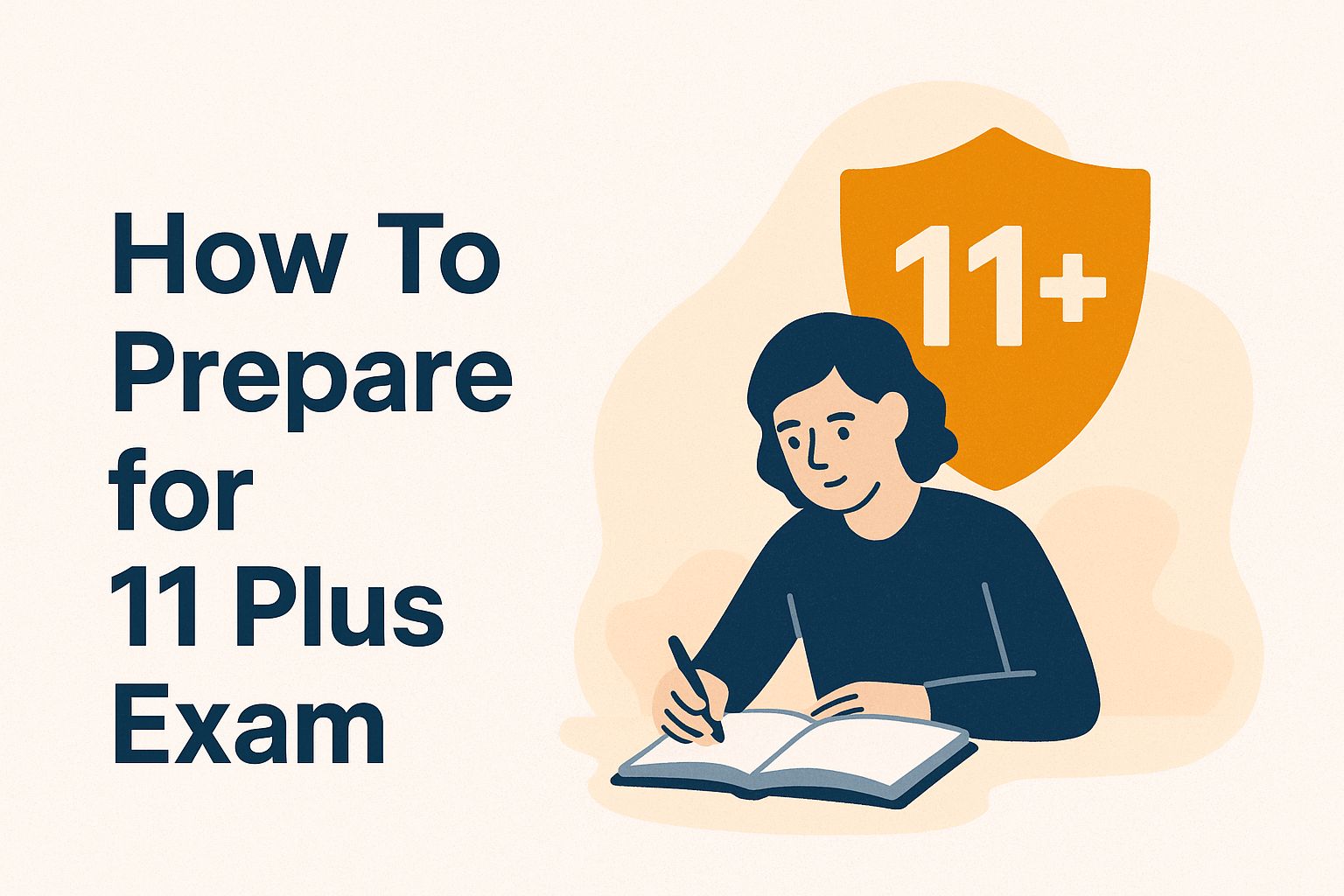
How To Prepare for 11 Plus Exam
The 11 Plus Exam can feel like a rite of passage for many students, but preparing for it doesn’t have to be a daunting task! Parents often ask how to prepare for 11 Plus exam, and the answer lies in understanding its structure, subjects, and strategies. Taking the right approach can ease anxiety and boost confidence.
From crafting a tailored study plan to discovering effective resources, there’s so much to explore. Ready to dive into the ultimate guide for conquering the 11 Plus? Let’s turn those nerves into excitement!
What is the 11 Plus Exam?
The 11 Plus Exam generally evaluates pupils in subjects such as English, Mathematics, Verbal Reasoning, and Non-Verbal Reasoning to determine their suitability for grammar school. This exam is administered to pupils aged 10 to 11 and varies by region within the UK.
For instance, in Buckinghamshire, the exam consists of two distinct papers focusing on mathematics and English. In contrast, regions like Lancashire may include an additional reasoning component.
To prepare effectively, parents often turn to a variety of resources, including past exam papers, online practice tests, and tutoring services. These tools can significantly enhance pupils’ familiarity with the exam format.
Additionally, investing time in mock exams can be beneficial, as it helps to reduce anxiety and improve performance on the actual exam day.
Importance of the 11 Plus Exam
Success in the 11 Plus Exam can pave the way for admission to prestigious grammar schools, which are known for delivering superior academic outcomes for students. Research shows that students from grammar schools tend to achieve higher GCSE and A-Level results compared to their counterparts in comprehensive schools.
For example, 73% of grammar school students attain five good GCSEs, in contrast to only 52% of students in comprehensive schools. This academic advantage can significantly improve university admission prospects, as a considerable number of grammar school students secure placements at esteemed institutions.
Ultimately, attending a grammar school can enhance career opportunities, granting access to more competitive job markets and the potential for higher earnings.
Understanding the Exam Structure
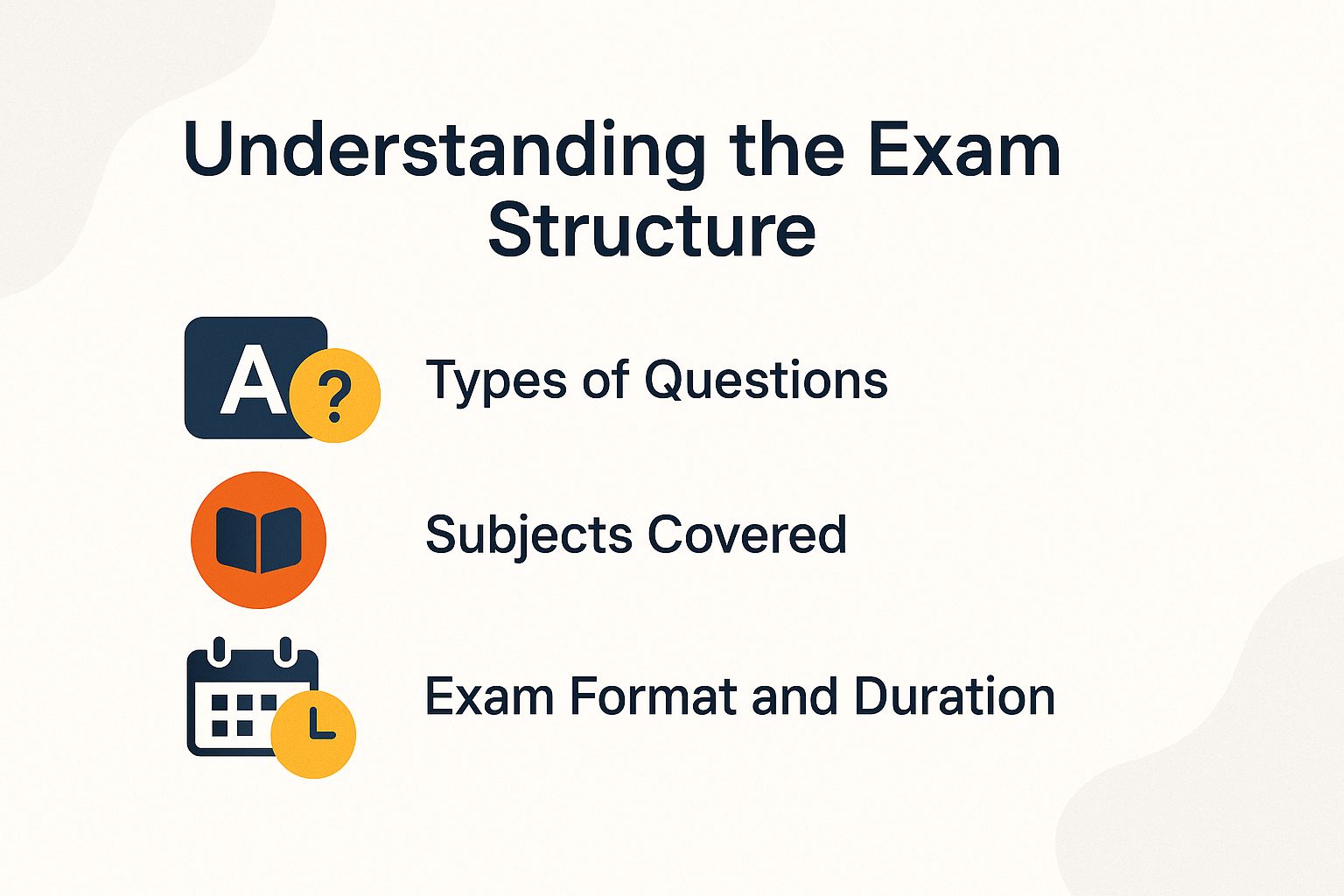
Understanding the structure of the 11 Plus Exam is essential for effective preparation. This exam includes a variety of question types and subjects that students need to master in order to succeed. For an extensive analysis of this, our comprehensive study of the exam format examines the different types and formats of the 11 Plus Exam.
Types of Questions
The exam comprises multiple-choice questions, comprehension tasks, and problem-solving exercises that evaluate both verbal and non-verbal reasoning skills.
Verbal reasoning often involves reading comprehension, where candidates analyse a passage and respond to questions related to it. For example, a typical question might be,
“What is the main idea of this paragraph?”
On the other hand, non-verbal reasoning assessments may include puzzles such as shape sequences, where participants are required to identify the next shape in a series.
Scoring is generally determined by the number of correct answers, with each question contributing equally to the overall score. This approach ensures fairness across the different types of questions presented.
Subjects Covered
English, Mathematics, and reasoning skills are the core subjects assessed in the 11 Plus Exam, and each requires a tailored approach to study.
To achieve success in the 11 Plus Exam, it is essential to implement focused study strategies for each subject. In terms of English, placing an emphasis on comprehension exercises and vocabulary enhancement is crucial. Resources like ‘Kirkman’s 11 Plus English’ can prove to be particularly beneficial.
In Mathematics, practising with past papers and utilising tools such as Bond Assessment Papers can help identify areas that need improvement. Meanwhile, reasoning skills can be sharpened through engaging with puzzles and logic games, such as those included in the ‘11 Plus Puzzle Book’. It is advisable to dedicate specific time each week to each subject to establish a well-rounded study routine.
Exam Format and Duration
The 11 Plus Exam typically lasts around 2.5 hours and is divided into sections for each subject, which necessitates effective time management throughout the test.
The exam generally comprises four main sections:
- English
- Mathematics
- Verbal Reasoning
- Non-Verbal Reasoning
Each section is allocated approximately 30 to 35 minutes, providing candidates with the opportunity to showcase their skills adequately. Break times tend to be minimal, making it crucial to maintain focus during the exam.
On the day of the exam, arriving early is advisable to minimise stress. It is also important to bring essential items, such as:
- a clear water bottle
- the necessary stationery
To boost confidence and enhance performance, familiarise yourself with the exam format by working through practice papers.
Creating a Study Plan
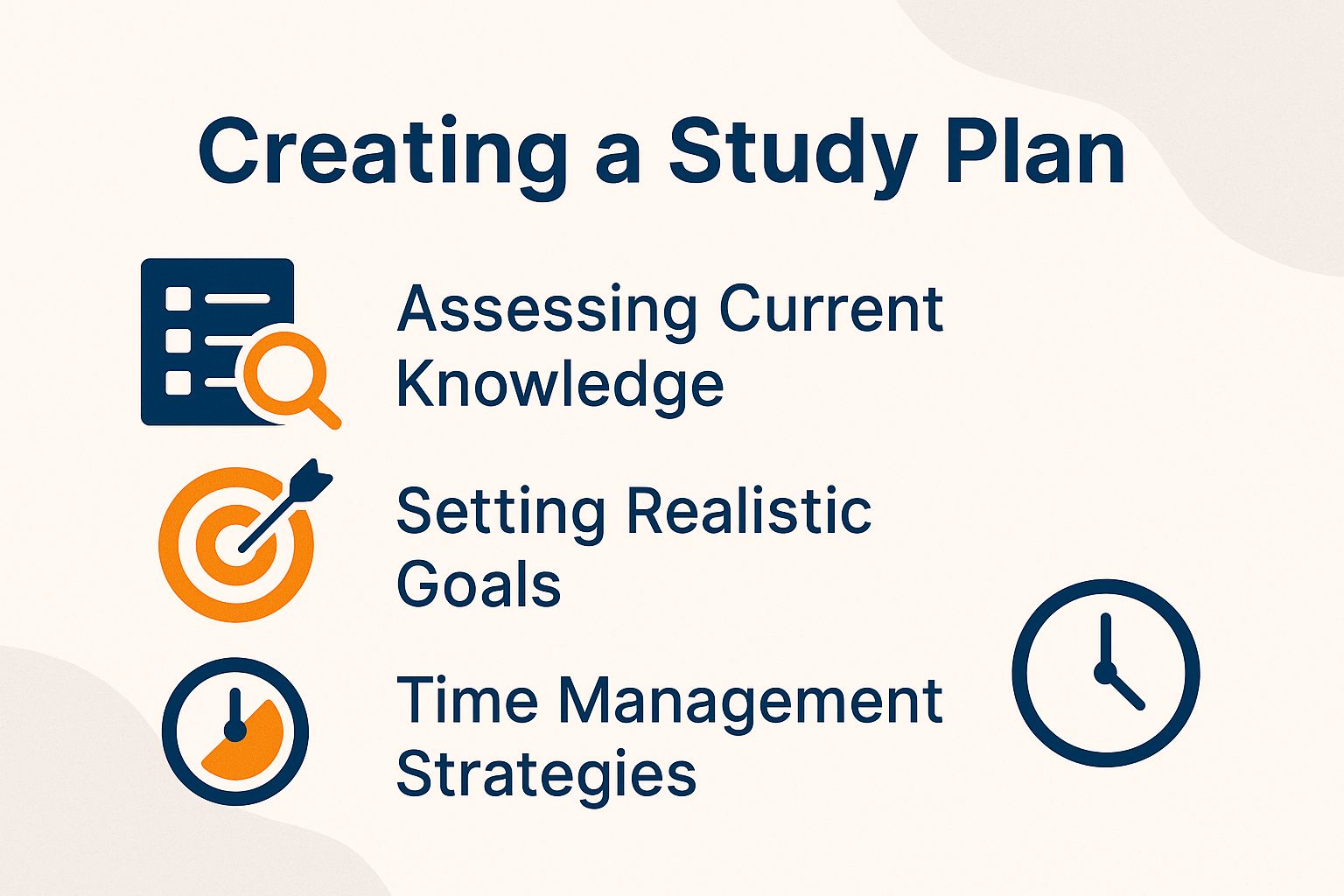
A well-structured study plan is essential for preparing for the 11 Plus exam. It helps students in effectively allocating their time and ensuring that they cover all the necessary topics.
Assessing Current Knowledge
Begin your preparation by evaluating your current knowledge through practice tests that closely simulate the content and format of the exam. This will help you identify your strengths and weaknesses.
You may find online quizzes from resources like Kahoot or Quizlet particularly useful, as they offer customizable assessments that can help pinpoint your knowledge gaps in specific subjects. The Bond 11+ practice papers also serve as an excellent resource for refining the skills that are relevant to your exam format.
Once you have reviewed the results of your practice tests, you can focus your study plan on the areas that need improvement. It is beneficial to set specific targets, such as completing two practice papers each week, and to schedule this study time in your calendar to ensure you maintain a consistent preparation routine.
Setting Realistic Goals
Setting realistic study goals is essential for maintaining motivation and focus, allowing for a balanced approach to mastering the subjects required for the 11 Plus Exam.
To create effective study goals, it is beneficial to employ the SMART criteria. For instance, instead of simply stating, “I want to study maths more,” a more effective goal would be,
“I will practise maths for 30 minutes every day at 4 PM for the next four weeks.”
This goal is specific, measurable, achievable, relevant, and time-bound.
Tracking progress is also important, and one can utilise tools such as Trello or even a straightforward calendar app to enhance accountability. By reviewing achievements on a weekly basis, adjustments can be made to goals and strategies as needed, which helps maintain motivation throughout the preparation process.
Time Management Strategies
Effective time management strategies can significantly alleviate the overwhelm that often accompanies studying, allowing students to break their preparation into manageable segments as they approach their exams.
One particularly effective method is the Pomodoro Technique, which involves working for 25 minutes followed by a 5-minute break. This approach not only enhances focus but also helps sustain energy levels throughout the study session.
For an 11 Plus preparation schedule, students might consider allocating their time as follows:
- Mornings for maths practice on Mondays and Wednesdays
- Afternoons for English reading and comprehension on Tuesdays and Thursdays
Additionally, parents could foster a regular review session on Sundays to help consolidate learning. Utilising a timer app like Focus Booster can further support adherence to this structured schedule.
Resources for Preparation
Utilising a range of resources can significantly improve preparation for the 11 Plus Exam. This approach ensures that students have access to thorough study materials and ample practice opportunities, which are essential for their success.
Books and Study Guides
Books such as ‘Bond 11+ Maths’ and ‘GL Assessment 11+ Verbal Reasoning’ are invaluable resources that offer structured content and practice for the examination.
To ensure well-rounded preparation, it is advisable to include ‘Schofield & Sims 11+ Practice Papers’ in your study materials. This particular book features authentic exam-style questions, making it an excellent choice for helping students become accustomed to the pressures of the exam environment.
Furthermore, the ‘CGP 11+ English Revision Guide’ presents effective strategies and exercises specifically designed for verbal reasoning. These books can be conveniently found on platforms such as Amazon or at local educational bookshops, allowing for a comprehensive collection that supports consistent practice as the exam day approaches.
Online Resources and Courses
Online platforms such as Atom Learning and 11 Plus Tutoring offer interactive courses and resources that are tailored to meet individual learning paces and styles.
For example, Atom Learning provides personalised learning paths and assessments at a subscription rate of £39 per month. With more than 10,000 practice questions available, it has enabled 80% of its users to improve their exam scores by at least one grade.
On the other hand, 11 Plus Tutoring focuses specifically on preparing students for entrance examinations, offering customised lessons that cater to each student’s needs. Their subscription begins at £29 per month and boasts a success rate of 70% for securing placements in first-choice schools.
Utilising these platforms can significantly enhance a child’s learning experience and boost their success in examinations.
Practice Papers and Mock Exams
Utilising practice papers and mock exams is essential for helping students become familiar with the exam format, enhancing their confidence, and ultimately improving their performance.
It is advisable to start by sourcing quality practice papers from reputable platforms, such as GL Assessment, which provides tailored materials for various subjects.
Scheduling mock exams every two weeks is a wise strategy to ensure steady progress, ideally aligning these sessions with the actual exam format.
After each mock exam, it is important to take the time to analyse the results. This allows students to identify their weaker areas and adjust their study focus accordingly.
For instance, if a student finds comprehension to be a struggle, dedicating additional sessions to thematic analysis or vocabulary enhancement can be beneficial.
This targeted approach not only hones specific skills but also fosters overall confidence in test-taking abilities.
Effective Study Techniques
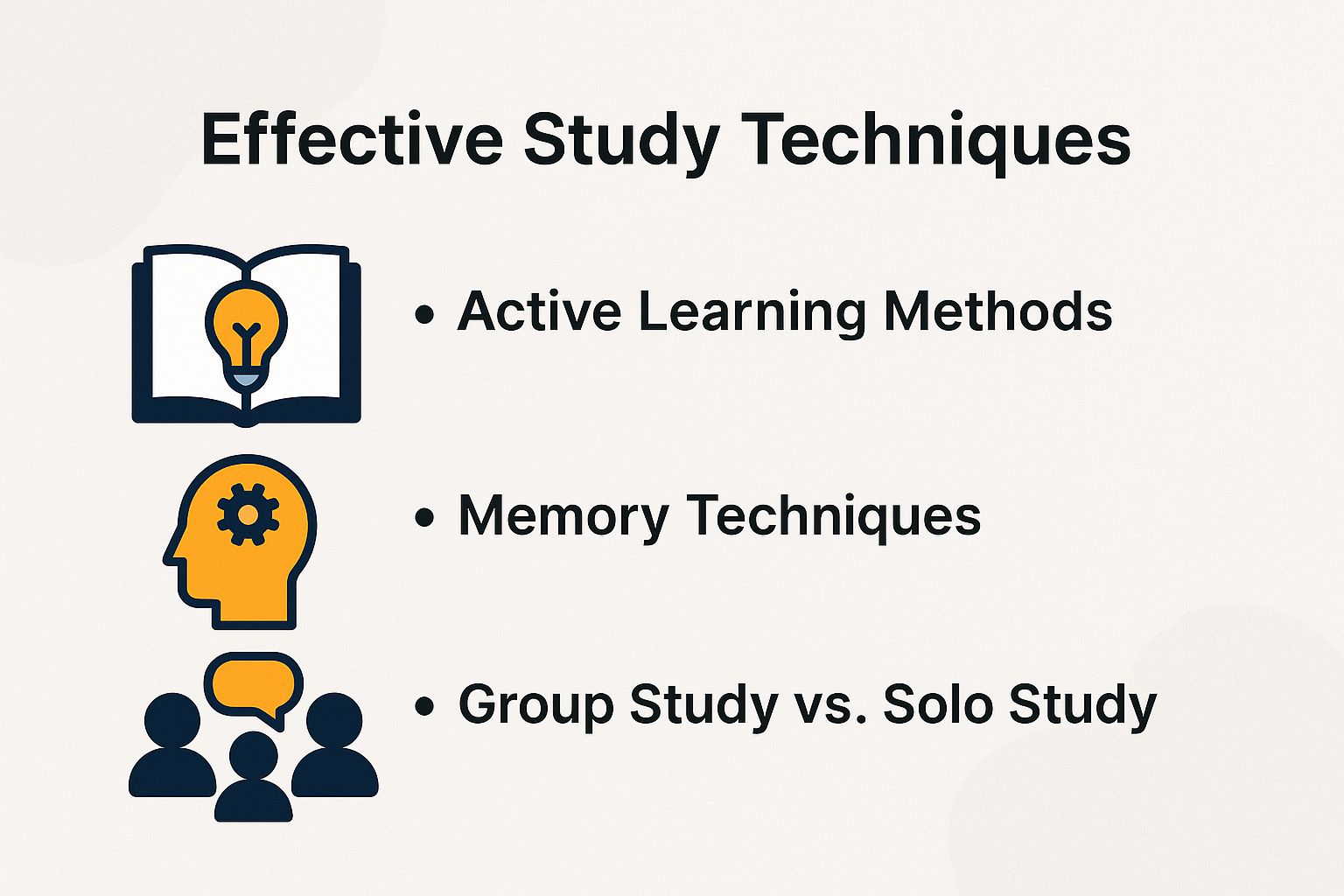
Utilising effective study techniques significantly enhances retention and comprehension, ultimately making exam preparation more productive and aligned with learning objectives.
By adopting these strategies, individuals can optimise their learning experiences and achieve better outcomes in their studies. Curious about how AI tools can further boost study efficacy? Our guide explains their innovative impact.
Active Learning Methods
Active learning methods, such as interactive quizzes and discussion groups, greatly enhance engagement and comprehension of the material when compared to passive review.
For example, using tools like Kahoot for quizzes can significantly increase participation, as students typically appreciate the competitive element and receive immediate feedback on their performance.
Discussion groups promote collaboration among students. Utilising platforms like Padlet allows for real-time sharing of ideas, which, in turn, enhances critical thinking skills.
Schools that have adopted these active learning techniques have reported increases in exam scores by as much as 20%. This suggests that these methods not only make learning more enjoyable but also yield measurable improvements in academic performance.
Overall, prioritising interaction over rote memorisation is essential for effective learning.
Memory Techniques
Incorporating memory techniques, such as mnemonics and spaced repetition, can significantly enhance information retention for the 11 Plus Exam. One particularly effective approach is utilising Anki, a flashcard tool that leverages spaced repetition to optimise the learning process.
For instance, you can create flashcards for vocabulary words or key concepts, allowing Anki to schedule reviews based on how well you recall the material.
Additionally, consider organising information into memorable phrases or acronyms, which can serve as useful mental hooks. For mathematics, it is beneficial to practise problems regularly, employing spaced intervals to reinforce your skills.
By combining these techniques, you can enhance retention and build confidence as the exam approaches.
Group Study vs. Solo Study
Both group and solo study methods offer distinct advantages, allowing students to choose between collaborative learning and focused individual work based on their personal preferences.
In a group study setting, students gain the benefit of shared insights, exposure to diverse perspectives, and immediate feedback. Engaging in discussions can clarify challenging concepts and foster a deeper understanding through peer explanations.
For example, forming a study group of three to five peers can significantly enhance problem-solving skills, especially in demanding subjects like mathematics or science.
On the other hand, solo study provides the opportunity for personalised pacing, enabling students to concentrate on specific areas that require improvement without distractions.
Research indicates that structured solo study sessions can boost retention rates by 25% when they are organised with clear goals and scheduled breaks.
Building Confidence
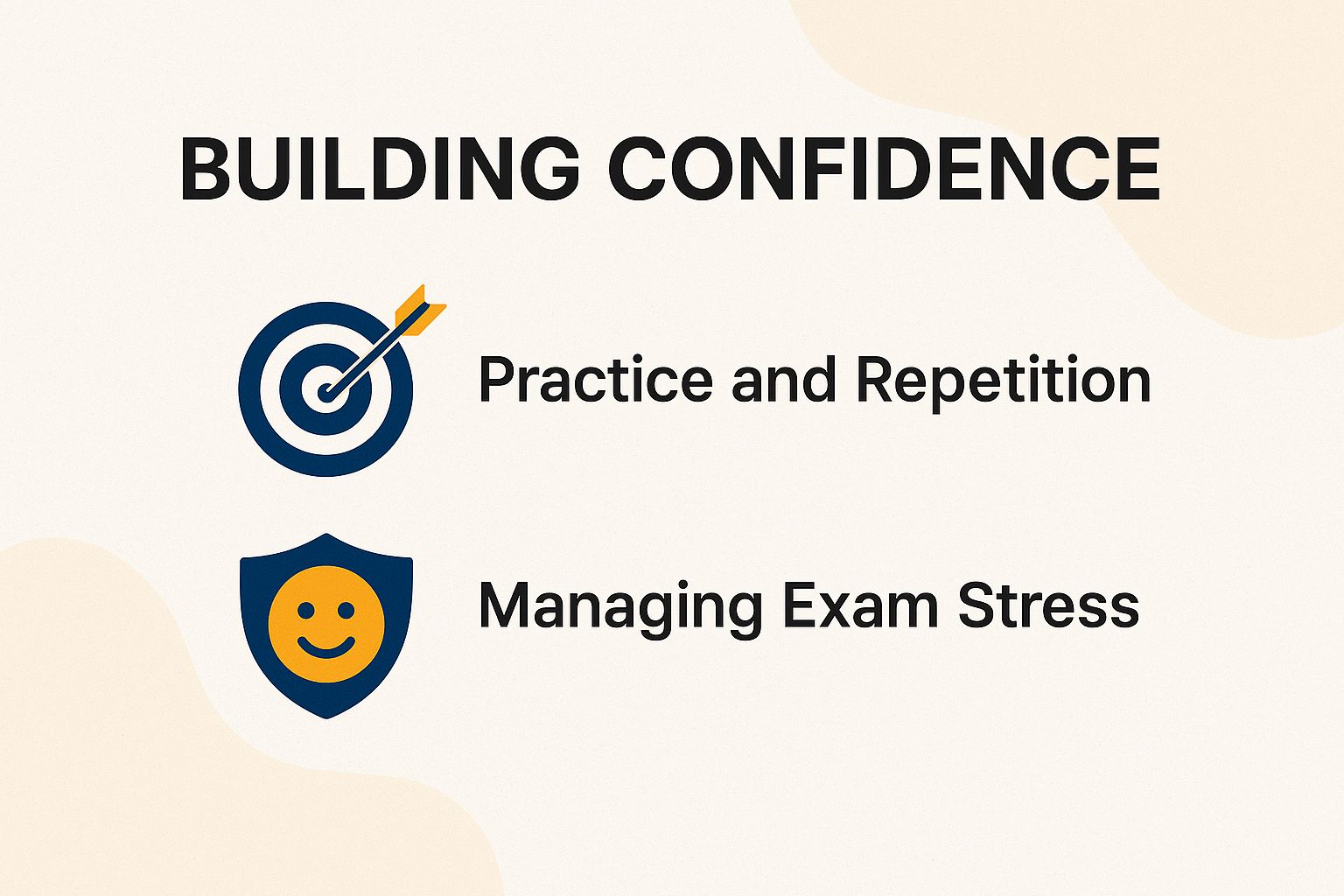
Building confidence is crucial for achieving success in examinations. It helps to reduce anxiety and enhances performance by fostering improved self-belief and thorough preparation.
Practice and Repetition
Regular practice and repetition of exam material can greatly enhance a student’s confidence, ultimately leading to improved performance on the actual test day.
To maximise effectiveness, it is advisable for students to establish a study schedule that designates specific time slots for practice each week, ideally allocating 1-2 hours daily.
Incorporating past exam papers is also essential; these resources allow students to familiarise themselves with various question formats while identifying areas that may need extra attention.
For example, setting aside Sundays for full-length practice exams can effectively simulate actual test conditions.
Additionally, utilising online platforms such as Khan Academy can provide tailored quizzes, allowing for a study routine that is both structured and adaptable to changing needs.
Managing Exam Stress
Employing stress management techniques, such as mindfulness and breathing exercises, can significantly reduce anxiety as the 11 Plus Exam approaches.
One particularly effective technique is the 4-7-8 breathing exercise. To practise this method, you would inhale deeply through your nose for 4 seconds, hold your breath for 7 seconds, and then exhale slowly through your mouth for 8 seconds. Repeating this cycle four times can help calm your mind and ease tension.
Additionally, you might consider guided visualisation using apps like Headspace or Calm, which provide sessions specifically designed to relieve exam-related stress. Dedicating just 10 minutes a day to these practices can greatly enhance your focus and lower anxiety levels, both during your preparation and while taking the exam itself.
Day of the Exam
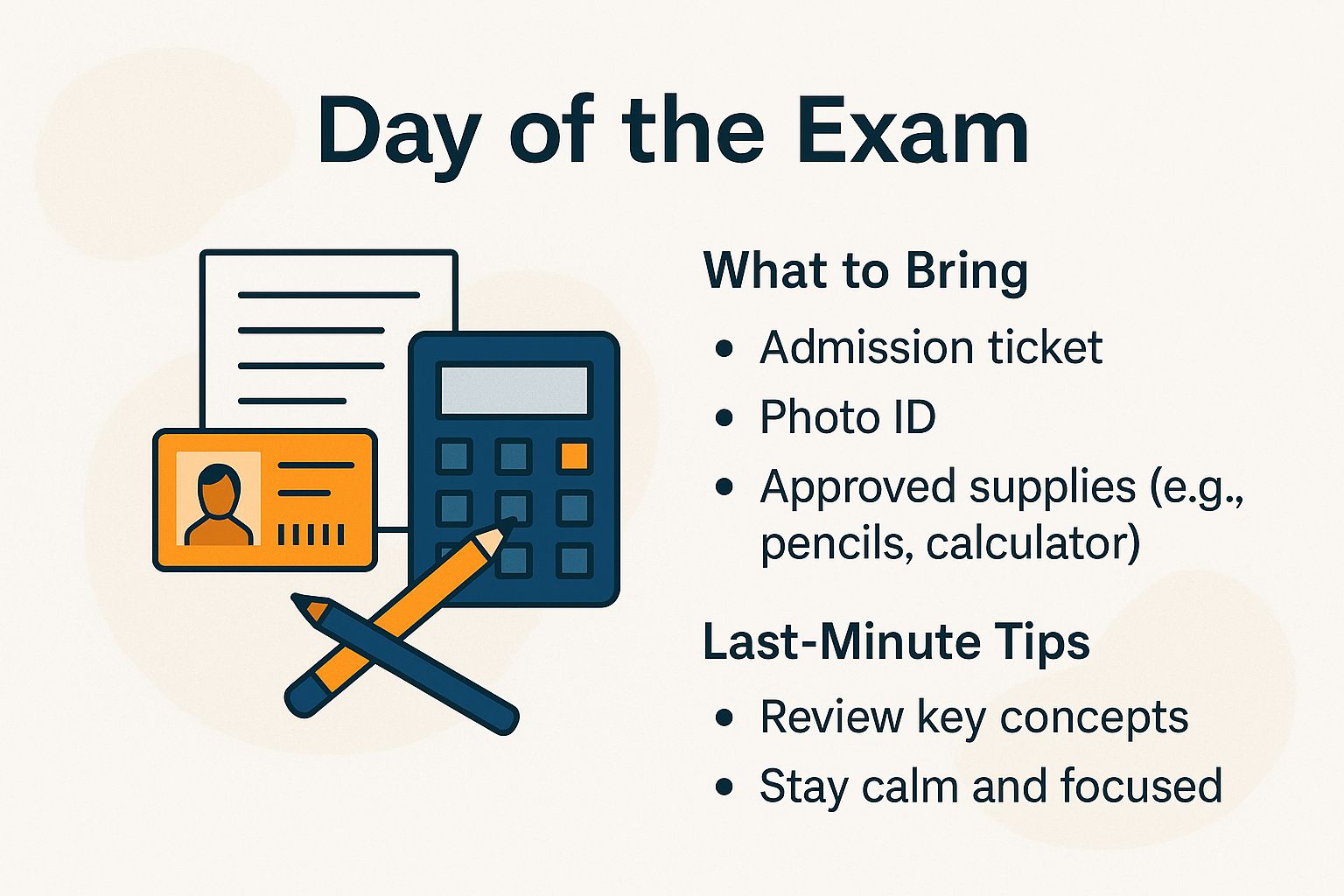
Adequate preparation for the 11 Plus Exam can have a substantial impact on a pupil’s performance and overall experience.
Taking the time to prepare properly can help ensure that pupils approach the exam with confidence and clarity.
What to Bring
Students should arrive at the 11 Plus Exam prepared with essential items, including stationery, a water bottle, and any necessary identification. Additionally, it is advisable to bring a clear plastic bag to store these items, as many testing centres require this for security purposes.
It is beneficial to include:
- Two sharpened pencils
- An eraser
- A ruler
- A highlighter
to assist with exam preparation. Packing a snack is also a wise choice, provided it complies with exam regulations. Organising these items the night before will help ensure that your bag is ready, thereby minimising morning stress and preventing last-minute scrambles.
Last-Minute Tips
Last-minute tips, such as ensuring a good night’s sleep and starting the day with a healthy breakfast, can greatly enhance a student’s focus and performance during the 11 Plus Exam.
Plus adequate rest and proper nutrition, it may be beneficial to incorporate mindfulness techniques to help alleviate pre-exam anxiety. Simple practices, such as deep breathing exercises, can be quite effective. For instance, one might inhale deeply for a count of four, hold the breath for another four counts, and then exhale for six counts.
It is also advisable to engage in brief study sessions interspersed with breaks to prevent feelings of overwhelm. Utilising tools like the Pomodoro timer can assist in maintaining this structured approach, allowing for a balanced combination of study and relaxation.
Furthermore, visualising success by picturing oneself confidently answering questions can significantly enhance self-assurance as one enters the exam room.
Frequently Asked Questions
What is the 11 Plus Exam and why is it important?
The 11 Plus Exam is a standardised test taken by students in their final year of primary school in the UK. It is important as it determines which secondary school a student will attend and can have a significant impact on their future academic and career opportunities.
When should I start preparing for the 11 Plus Exam?
It is recommended to start preparing for the 11 Plus Exam at least a year in advance. This will give you enough time to cover all the necessary material and practise effectively.
What subjects are tested in the 11 Plus Exam?
The 11 Plus Exam typically tests a student’s proficiency in English, Mathematics, and Verbal and Non-Verbal Reasoning. Different areas may have different content for the exam, so it is important to check with your local authorities for specific details.
How can I prepare for the 11 Plus Exam?
There are various ways to prepare for the 11 Plus Exam, including enrolling in a preparation course, using practice papers and books, and working with a tutor. It is important to find a method that works best for you and to consistently practise and review material.
What are some tips for success on the 11 Plus Exam?
Some helpful tips for success on the 11 Plus Exam include starting your preparation early, staying organised, practising under timed conditions, and reviewing material regularly. It is also important to get a good night’s sleep before the exam and to remain calm and focused during the test.
What if I don’t pass the 11 Plus Exam?
If you do not pass the 11 Plus Exam, it is not the end of the world. There are still options available, such as appealing the results, taking the test again, or attending a different secondary school. It is important to stay positive and keep working towards your academic goals.



